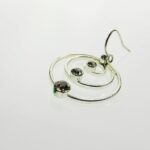
Some problems whisper before they scream. Vision is one of them.
That slight blur in one eye. The way your depth perception’s off when you back into a parking space. The light that feels too bright today but didn’t yesterday. You notice it. You ignore it. Because there’s a meeting. Because your phone’s always in your hand. Because everything seems urgent, except your own body.
But your eyes are talking. And if something feels off, it probably is.
Blurry Isn’t Harmless
You assume it’s just a screen thing. Too many hours online. Bad lighting. Maybe you didn’t sleep. You figure it’ll pass. But that’s how serious conditions start: quiet, easy to dismiss.
Not everything that impacts your sight arrives like a crisis. Sometimes it just feels like a weird shadow that won’t go away. Or a pressure you didn’t notice until you tried to read small text.
The scariest part? The most dangerous eye conditions often don’t hurt. There’s no drama. Just slow, irreversible change if you ignore the signs.
What Sudden Vision Changes Could Actually Mean
It’s not about paranoia. It’s about awareness.
Sudden blurriness, floaters, flashes of light, tunnel vision, reduced peripheral vision, even a faint greyness creeping into part of your sight—these are all signals. They can point to retinal detachment, glaucoma, optic nerve inflammation, blood vessel issues, and more. Some are treatable. Some are not. The only thing worse than not knowing is pretending not to notice.
“I Was Just Tired”
It’s the most common excuse. You felt foggy. Your head hurt. Your eye felt strained. You chalked it up to stress or lack of water or the million other things we use to rationalize not dealing with discomfort.
But your body keeps score. If your eye is trying to tell you something, it will not stop until it gets your attention or until you lose the chance to respond.
Waiting Is a Risk
The delay isn’t neutral. It’s not “being cautious” or “waiting to see.”
Every hour matters when it comes to sudden vision loss. Some retinal issues, once left untreated, lead to permanent damage within days. Other conditions, like acute glaucoma, need immediate intervention to prevent total blindness in one or both eyes.
The “wait and see” approach is how people lose their vision. And they never see it coming.
What You Should Actually Do
You don’t need to panic. You need to pay attention. If something shifts in how you see—even if it’s minor—your next move should be simple. Get it checked. Not by a friend, not by a forum, and definitely not by TikTok. You need a professional with diagnostic tools, someone trained to spot what you can’t.
If you don’t know where to start, when seeing clearly means acting fast isn’t just a phrase. It’s the difference between catching something early and learning about it when it’s too late.
The Fear of Knowing
Sometimes it’s not about time. It’s about fear. You avoid the appointment because you don’t want bad news. You tell yourself if you don’t confirm it, it’s not real. But fear doesn’t prevent outcomes. Action does. And most of the time, the news isn’t catastrophic—it’s manageable. But only if you show up for it.
Your Eyes Aren’t Overreacting
The human body is good at protecting itself. It alerts, compensates, adjusts. But it also gets tired. And your eyes? They’ve been doing the work of two full-time employees without so much as a check-in. If they’re sending you signs—blur, strain, double vision, sharp changes—your job isn’t to ignore them. It’s to respond.
You Can’t Undo Vision Loss
Here’s the reality no one likes to say out loud. Some things, once lost, don’t come back. You don’t get a second shot at seeing clearly. You can’t replay the moment you should’ve acted. That’s why clarity matters. That’s why noticing matters. And that’s why what you do next could literally change how you see the world tomorrow.
If you’re unsure what’s normal and what’s not, there are steps you can take to preserve your eyesight and improve your vision outlined by Health Canada, especially as your eyes age.
Believe Your Body
Your vision is worth protecting. Not just because it helps you work or drive or recognize faces. But because it’s yours. And the second you feel it slipping, your only job is to listen. Your eyes are telling you something. Believe them.













